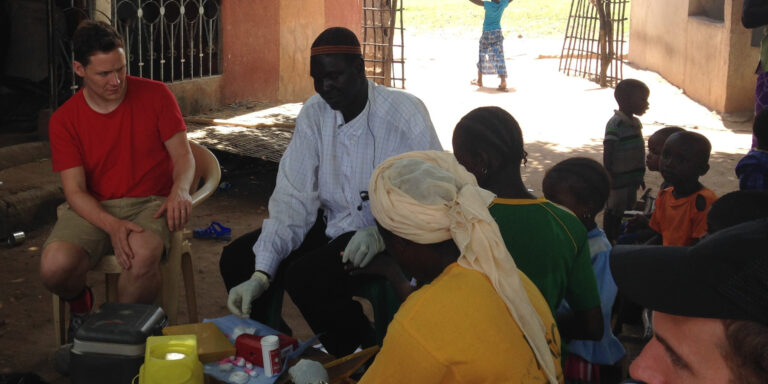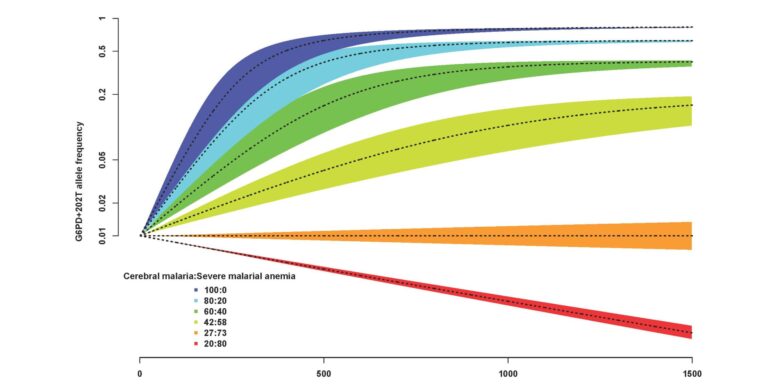Introduction
Consortial Project 1 investigated human genetic factors involved in resistance to severe malaria in order to better understand why, in regions where people are repeatedly exposed to malaria parasites, some people die from the infection while others survive.
Objectives & Coordination
Investigating the genetic determinants of resistance to malaria
A person’s risk of developing severe malaria is influenced by many different genetic and environmental factors, but we know relatively little about their precise nature and how they interact.
This project’s primary objective was to better understand the human genetic factors involved in resistance to severe malaria. This information could provide vital clues about molecular mechanisms of protective immunity and host-parasite interactions, as well as accelerate the development of an effective vaccine.
There are many aspects to our work:
- Leading research into the ethical issues inherit in these studies, for example informed consent, and data-sharing in low- and middle-income countries
- Working with our partner studies to support the necessary clinical research infrastructure to gather standardised samples from many thousands of individuals in several malaria-endemic countries in Africa
- Generating a large and unique data resource for case-control and family-based studies of genetic resistance and susceptibility to severe malaria
- Developing methods to overcome the unique challenges confronting multi-centre genome-wide association studies (GWAS) in Africa, for example higher levels of genetic diversity, ethnic diversity, and population structure in Africa than on other continents
- Supporting capacity building for genetic and genomic research amongst scientists in malaria-endemic countries.
This project began shortly after MalariaGEN was formed in 2005, and has greatly influenced our approach to collaborative science.
Locations
Across the different partner studies, samples were collected from 11,890 children and adults with severe P. falciparum malaria and 17,441 healthy controls matched with the cases by ethnic group, providing a unique resource for case-control and family-based studies.
Sampling locations
Burkina Faso, Cameroon, The Gambia, Ghana, Kenya, Malawi, Mali, Nigeria, Papua New Guinea, Tanzania, Vietnam.
Data
The MalariaGEN human consortial projects have produced substantial data resources and collectively agreed to a managed access mechanism for releasing Human GWAS data sets.
For information on how to apply for access, see Human GWAS data.
Current
Host-parasite interaction using over 4,000 DNA samples from children confirmed to have severe malaria in the period 1995-2009 to test for association between human and P.falciparum genetic variants.
Terms of use
Genome-wide genotype data for 10,792 severe malaria- affected individuals and 10,063 controls from eleven worldwide populations; and direct typing of selected genetic variants in 15,865 severe malaria-affected individuals and 19,845 controls from the same populations.
Apply for access to
Human GWAS data
EGA Study ID: EGAS00001001311
Three populations: Gambia (2,786 controls; 2,807 cases; 1 parents); Kenya (1,708 controls; 1,944 cases; 180 parents; 33 other); Malawi (1,498 controls; 1,590 cases)
Apply for access to
Human GWAS data
Archived
EGA Study ID: EGAS00001000807
Three populations: Gambia (1,533 controls; 1,247 cases); Kenya (1,544 controls; 1,711 cases); Malawi (2,239 controls; 1,451 cases)
Apply for access to
Human GWAS data
Archived
EGA Study ID: EGAS00000000026
EGA Data Set IDs: EGAD00000000017 (1,496 controls); EGAD00000000018 (1,059 cases)
Method: Affymetrix 500K array
Apply for access to
Human GWAS data
Archived
EGA Study IDs: EGAS00000000087 (Gambia); EGAS00000000088 (Ghana)
Three populations: Gambia (658 trios; 1,984 individuals); Ghana (608 trios; 1,824 individuals); Malawi (122 trios; 366 individuals)
Method: Illumina 650Y array
Apply for access to
Human GWAS data
Partner studies
We worked with investigators who pursued independent partner studies in a number of malaria-endemic countries.
About this study Summary Study site description Methods Ethics Additional contributors Acknowledgements Key people Malaria is a leading cause of death in much of sub-Saharan Africa (World Health Organization, 2008). Host genetic factors…
About this study Summary Study site description Methods Ethics Additional contributors Acknowledgements Key people The last decade has seen a decline in the number of reported malaria cases in Vietnam from 187,994 in…
About this study Summary Study site description Methods Ethics Additional contributors Acknowledgements Key people Severe malaria is a life-threatening disease that kills over a million individuals every year, with 90% of the deaths…
About this study Summary Study site description Methods Ethics Additional contributors Acknowledgements Key people Severe malaria, caused by infection with Plasmodium falciparum, remains one of the major health problems in sub-Saharan Africa (World…
About this study Summary Study site description Methods Ethics Additional contributors Acknowledgements Key people Plasmodium falciparum malaria has been identified as the cause of 30-40% of paediatric hospital attendances and up to 30%…
About this study Summary Study site description Methods Ethics Additional contributors Acknowledgements Key people Malaria is a life-threatening parasitic disease transmitted by Anopheles mosquitoes. Despite major efforts to control the disease, it still…
About this study Summary Study site description Methods Ethics Additional contributors Acknowledgements Key people Malaria remains one of the leading causes of morbidity and mortality in malaria endemic regions of the world. The…
About this study Summary Study site description Methods Ethics Additional contributors Acknowledgements Key people Malaria is known to be a strong factor for selection of human genes that give protection against the disease.…
About this study Summary Study site description Methods Ethics Additional contributors Acknowledgements Key people The populations of the South West Pacific are highly diverse and exhibit a range of red blood cell (RBC)…
About this study Summary Study site description Methods Ethics Additional contributors Acknowledgements Key people Genetic factors play an important role in resistance to malaria infection but many of the genes responsible remain unknown.…
About this study Summary Study site description Methods Ethics Additional contributors Acknowledgements Key people Malaria, caused by the parasite Plasmodium falciparum, remains the most important disease in sub-Saharan Africa and a leading cause…
About this study Summary Study site description Methods Ethics Additional contributors Acknowledgements Key people Malaria remains one of the most widespread infectious diseases of humankind, causing debilitating illness in hundreds of millions of…
Publications
- The protective effect of sickle cell haemoglobin against severe malaria depends on parasite genotype
Gavin Band, Ellen M. Leffler, Muminatou Jallow, Fatoumatta Sisay-Joof, Carolyne M. Ndila, Alexander W. Macharia, Christina Hubbart, Anna E. Jeffreys, Kate Rowlands, Thuy Nguyen, Sónia Gonçalves, Cristina V. Ariani, Jim Stalker, Richard D. Pearson, Roberto Amato, Eleanor Drury, Giorgio Sirugo, Umberto d’Alessandro, Kalifa A. Bojang, Kevin Marsh, Norbert Peshu, Joseph W. Saelens, Mahamadou Diakité, Steve M. Taylor, David J. Conway, Thomas N. Williams, Kirk A. Rockett & Dominic P. KwiatkowskiMalaria protection due to sickle haemoglobin depends on parasite genotype, 2021;- Insights into malaria susceptibility using genome-wide data on 17,000 individuals from Africa, Asia and Oceania
MalariaGENNature Communications, 2019; 10 5732- Human candidate gene polymorphisms and risk of severe malaria in children in Kilifi, Kenya: a case-control association study
Ndila CM, Uyoga S, Macharia AW, Nyutu G, Peshu N, Ojal J, Shebe M, Awuondo KO, Mturi N, Tsofa B, Sepulveda N, Clark TG, Band G, Clarke G, Rowlands K, Hubbart C, Jeffreys A, Kariuki S, Marsh K, Mackinnon M, Maitland K, Kwiatkowski DP, Rockett KA & Williams TN.The Lancet Haematology, 2018; 5- Two complement receptor one alleles have opposing associations with cerebral malaria and interact with alpha(+)thalassaemia
Opi DH, Swann O, Macharia A, Uyoga S, Band G, Ndila CM, Harrison EM, Thera MA, Kone AK, Diallo DA, Doumbo OK, lyke KE, Plowe CV, Moulds JM, Shebbe M, Mturi N, Peshu N, Maitland K, Raza A, Kwiatkowski DP, Rockett KA, Williams TN & Rowe JA.eLife, 2018; 7- Evidence from a natural experiment that malaria parasitemia is pathogenic in retinopathy-negative cerebral malaria
Small, Taylor et al.eLife, 2017; 6 e2369- Malaria host candidate genes validated by association with current, recent and historic measures of transmission intensity
Sepúlveda, Manjurano et al.The Journal of Infectious Diseases, 2017;- Resistance to malaria through structural variation of red blood cell invasion receptors
Leffler, Band et al.Science, 2017;- Characterisation of the opposing effects of G6PD deficiency on cerebral malaria and severe malarial anaemia
Clarke, Rockett et al.eLife, 2017; 6 e15085- Admixture into and within sub-Saharan Africa
Busby et aleLife, 2016; 5:e15266- A novel locus of resistance to severe malaria in a region of ancient balancing selection
Malaria Genomic Epidemiology NetworkNature, 2015; 526(7572) 253-257- USP38, FREM3, SDC1, DDC, and LOC727982 Gene Polymorphisms and Differential Susceptibility to Severe Malaria in Tanzania
Manjurano et al.Journal of Infectious Diseases, 2015; 212(7) 1129-39- African glucose-6-phosphate dehydrogenase alleles associated with protection from severe malaria in heterozygous females in Tanzania
Manjurano et al.PloS Genetics, 2015; 11(2) e1004960- Reappraisal of known malaria resistance loci in a large multi-centre study
Rockett et al.Nature Genetics, 2014; 46(11) 1197-204- Association of candidate gene polymorphisms and TGF-beta/IL-10 levels with malaria in three regions of Cameroon: a case-control study
Apinjoh et al.Malaria Journal, 2014; 13 236- Association of cytokine and Toll-like receptor gene polymorphisms with severe malaria in three regions of Cameroon
Apinjoh et al.PLoS One, 2013; 8(11) e81071- Imputation-based meta-analysis of severe malaria in three African populations
Band et al.PloS Genetics, 2013; 9(5) e1003509- Candidate human genetic polymorphisms and severe malaria in a Tanzanian population
Manjurano et al.PLoS One, 2012; 7(10) e47463- Candidate polymorphisms and severe malaria in a Malian population
Toure et al.PLoS One, 2012; 7(9) e43987- Variation in human genes encoding adhesion and proinflammatory molecules are associated with severe malaria in the Vietnamese
Dunstan et al.Genes Immunology, 2012; 13(6) 503-8- Severe and uncomplicated falciparum malaria in children from three regions and three ethnic groups in Cameroon: prospective study
Achidi et al.Malaria Journal, 2012; 11 215- Variation in human genes encoding adhesion and proinflammatory molecules are associated with severe malaria in the Vietnamese
Dunstan SJ et alVariation in human genes encoding adhesion and proinflammatory molecules are associated with severe malaria in the Vietnamese, 2012; 13(6) 503-8- Genome-wide and fine-resolution association analysis of malaria in West Africa
Jallow et al.Nature Genetics, 2009; 41(6) 657-65- A global network for investigating the genomic epidemiology of malaria
Malaria Genomic Epidemiology NetworkNature, 2008; 456(7223) 732-7
Project contact
People
See a full list of those involved with the foundation of the MalariaGEN Consortium.
- Dr Alphaxard Manjurano
- Dr Anita Ghansah
- Dr Jean-Bosco Ouedraogo
- Dr Anthony Enimil
- Prof Alfred Amambua-Ngwa
- Dr Carolyne Ndila
- Prof Chris Drakeley
- Dr Patrick Duffy
- Prof David Conway
- Dr Pascal Ringwald
- Prof David Modiano
- Dr Tim Anderson
- Dr Edith Bougouma
- Dr Thomas E Wellems
- Prof Eleanor Riley
- Prof Nicholas J White
- Prof Eric Akum Achidi
- Irene Omedo
- Giorgio Sirugo
- Prof Francois Nosten
- Hugh Reyburn
- Prof Ivo Mueller
- Dr Lucas Amenga-Etego
- Dr Kalifa Abubakr Bojang
- Prof Kevin Marsh
- Dr Thuy‐Nhien Nguyen
- Prof Kwadwo Koram
- Dr Laurens Manning
- Brigitte Denis
- Dr Diego F Echeverry
- Prof Mahamadou Thera
- Dr Teun Bousema
- Prof Malcolm Molyneux
- Prof Michael Wilson
- Dr Muminatou Jallow
- Nguyen Thi Ngoc Quyen
- Dr Norbert Peshu
- Prof Ogobara Doumbo
- Dr Olukemi Amodu
- Ousmane Boubacar Toure
- Assoc Prof Pascal Michon
- Dr Sarah Dunstan
- Dr Sodiomon Bienvenu Sirima
- Prof Stephen Allen
- Prof Terrie Taylor
- Dr Tobias Apinjoh
- Prof Tom Williams
- Professor Elizabeth Ashley
- Prof Tran Tinh Hien
- Dr Alyssa Barry
- Prof Tsiri Agbenyega
- Prof Gordon Awandare
- Valentina Mangano
Documents
Updates
9 Oct 2015
Malaria Journal



